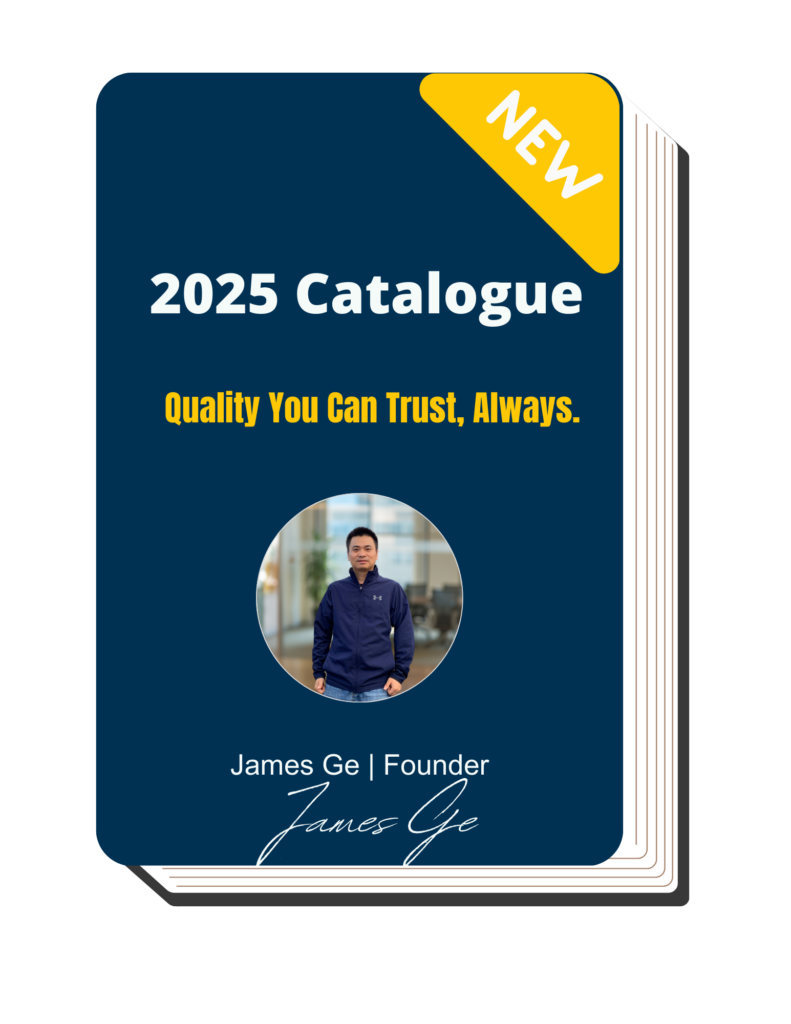I used to think price was everything.
If a trailer looked decent and the price was right, I’d buy it. Simple as that. But over time, I learned a hard truth that you can’t see poor build quality until it’s too late.
One trailer I bought started rusting after its first rainy season. Another one had tire blowouts within weeks. And the real headache? No support. No one picked up the phone.
So if you’re here searching for a car trailer manufacturer that won’t leave you guessing, I get it.
This article is for you, who needs a trailer that actually does the job, without surprises. I’ve put together 7 manufacturers worth looking at. You’ll see who they are, what they build, and how they support you.
So, let’s start!
Quick Comparison
Before we dig into each manufacturer in detail, here’s a quick look at how they compare. This table gives you a simple side-by-side to help you find what matters most:
| Manufacturer | Year Founded | Headquarters | Trailer Types | Monthly Output | Key Strengths |
| Hyundai Translead | 1989 | San Diego, USA | Dry vans, refrigerated trailers, flatbeds | Approx. 6,500+ | Galvanized components, North American support, large volume |
| Wabash National Corporation | 1985 | Indiana, USA | Dry vans, refrigerated trailers, flatbeds | Approx. 5,800+ | DuraPlate® panels, sustainability focus, design flexibility |
| Rhinotrail | ~2012 | Shandong, China | Flatbeds, low-beds, dump trailers, tankers, container chassis, reefers | 2,500–3,000 units | Fast delivery, terrain-ready, flexible specs |
| Utility Trailer Mfg. Co. | 1914 | California, USA | Dry vans, refrigerated trailers, flatbeds, curtainside (Tautliner®) trailers | Not disclosed | U.S.-built, long legacy, high resale value |
| Great Dane | 1900 | Georgia, USA | Refrigerated trailers, dry vans, flatbeds, truck bodies | Top 3 U.S. producer | FleetPulse tech, wide service network, safety-first design |
| Schmitz Cargobull | 1892 | Horstmar, Germany | Refrigerated, curtainsider, box, tippers, container chassis | 6,000–7,000 units | Telematics system, cold chain focus, EU-wide support |
| Faymonville Group | 1962 | Büllingen, Belgium | Modular, low-loaders, extendable, hydraulic-steer trailers | 600–700 units | Oversized loads, route-specific engineering, modular systems |
You’ve got a clear side-by-side view. Let’s move into the details and find out which company truly fits
1. Hyundai Translead
When I started searching for a long-haul trailer that could handle frequent jobs without breaking down, I kept running into one name: Hyundai Translead.
At first, I assumed they were just another big company with shiny branding. But the more I looked, the more I saw consistency, trailers that held up, support teams that responded, and specs that matched real-world needs. If you’re like me, you’re probably looking for a manufacturer who makes trailers you can actually count on. Hyundai Translead aims to do just that.
They started back in 1989 as a division of Hyundai Motor Company. Their goal? To bring reliable, high-volume trailer manufacturing to the North American market.
Quick Facts:
- Year founded: 1989
- Founders: Subsidiary of Hyundai Motor Company
- Employees: Around 2,000
- Production capacity: Over 80,000 units per year
- Factory size: 3 major facilities in Tijuana, Mexico
So, how does this scale benefit you? It means better supply consistency, faster production turnaround, and more available parts when something needs replacing.
Company Story & Global Reach
Let’s step back a bit. Why does company history matter when you’re buying a trailer?
In my experience, manufacturers with real roots tend to stick around and that means better long-term support.
Hyundai Translead is headquartered in San Diego, California, with a strong production presence across Mexico. They’ve grown to become one of the largest trailer producers in North America.
Their reach includes:
- Nationwide dealer networks
- Long-standing relationships with logistics companies
- Distribution support throughout the U.S., Canada, and Mexico
So, whether you’re operating locally or across borders, you’re more likely to get service when you need it.
Key Products & Technologies
If you’re wondering what they actually build, here’s a quick breakdown.
Hyundai Translead manufactures a wide range of trailers for commercial use. Their lineup includes:
- Dry Van Trailers: Used for general freight. Built with corrosion-resistant materials and steel-reinforced side walls.
- Refrigerated Trailers (ThermoTech®): Designed to keep goods cool during transport. Ideal for food, agriculture, and pharmaceutical deliveries.
- Flatbed Trailers: Great for hauling vehicles, construction materials, or oversized cargo.
Contact
Want to reach out directly? Here’s how:
- Phone: (619) 574-1500
- Address: 8880 Rio San Diego Drive, Suite 600, San Diego, CA 92108
- Dealer locator: Dealer Network
- Showroom hours: Not listed online, best to call ahead
Final Verdict
So, is Hyundai Translead the right choice for you?
From what I’ve seen, they’re strong on durability and customer support. Their scale means fewer delays. Their engineering is solid. And they back their products with real service, something I’ve learned to value more and more over time.
But they’re not for everyone. If you’re running a small outfit with a tight budget, pricing might be higher than average. And lead times can stretch during peak seasons.
That said, Hyundai Translead is a solid pick for:
- Logistics and freight companies
- Agriculture and cold chain businesses
- Industrial and retail transport fleets
- Buyers who prioritize long-term use over short-term cost
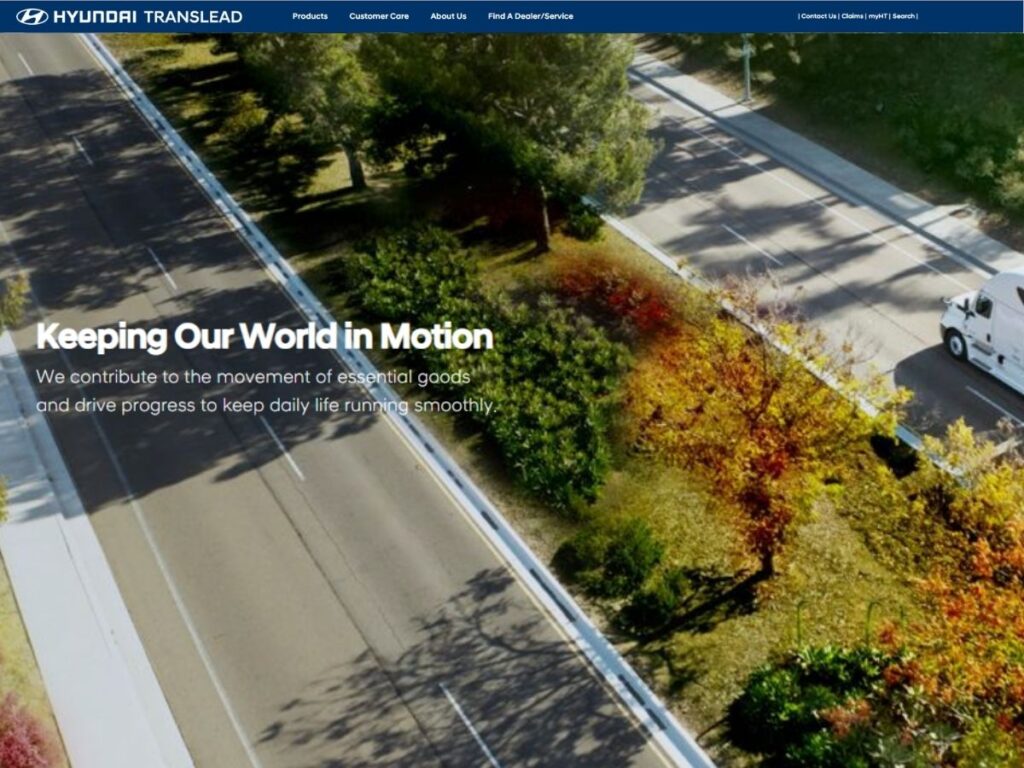
2. Wabash National Corporation
Back when I was searching for a trailer partner who could actually keep up with demand, Wabash kept coming up in conversations with other logistics managers. I figured I’d look into them and I’m glad I did.
Wabash National Corporation started in 1985. From the beginning, their focus has been solving a key problem for people like you and me: building strong, long-lasting trailers that don’t fall apart after a few heavy runs.
They grew fast, and today they’re one of the most recognized names in North American trailer manufacturing.
Quick facts:
- Year founded: 1985
- Founder: Jerry Ehrlich
- Number of employees: Around 6,700
- Number of units produced per year: Over 70,000
- Factory size: Multiple plants across the United States
Company Story & Global Reach
So, why should you care about their history?
In my experience, a company’s background often tells you how they’ll treat you. Wabash started with one facility in Lafayette, Indiana. Over the years, they expanded across the U.S., and their trailers are now used in all kinds of industries, from food and retail to manufacturing and construction.
They’ve built a strong footprint across North America, supported by a wide dealer network. If something breaks or you need help, chances are someone nearby can step in.
This kind of support isn’t always obvious upfront, but it matters later especially if you run into unexpected delays or need parts fast.
Key Products & Technologies
Next, let’s talk about what they actually build.
Wabash offers several types of trailers, each designed for specific jobs:
- Dry van trailers: These are enclosed trailers used to carry general freight. Wabash uses a material called DuraPlate®, which is a lightweight composite panel that adds durability.
- Refrigerated trailers: These help transport temperature-sensitive goods like produce, dairy, or pharmaceuticals.
- Flatbed trailers: A good pick if you’re hauling equipment, vehicles, or other bulky cargo.
If you’re wondering what makes their trailers different, it often comes down to materials. Their use of composite panels and other engineering upgrades means fewer breakdowns and better fuel efficiency.
Key Strengths
From what I’ve seen and heard, here’s what Wabash does well:
- They build strong, high-performance trailers with modern materials
- Their production capacity allows faster turnaround for large orders
- Their commitment to reducing waste and improving efficiency stands out—they’re ISO 14001:2004 certified, which shows they follow strict environmental standards
- Their customer service is solid, with support that covers everything from design to post-delivery help
Contact
- Phone: (765) 771-5300
- Address: 1000 Sagamore Parkway S, Lafayette, IN 47905
- Dealer network: Use their location search tool to find dealers across North America
- Showroom hours: Not listed online, so it’s best to call ahead
Final Verdict
So, is Wabash a good fit for you?
If you’re looking for durability, volume production, and solid support, Wabash is worth a serious look. Their trailers hold up well, and their innovation in materials like DuraPlate® gives them an edge in performance and weight savings.
But keep in mind: with innovation often comes a higher price tag. That could be a challenge if your budget is tight or if you’re just starting out.
Wabash is best for:
- Large logistics and freight companies
- Construction firms with frequent hauls
- Retail and food distributors needing temperature control
- Buyers looking for long-term durability over low upfront cost
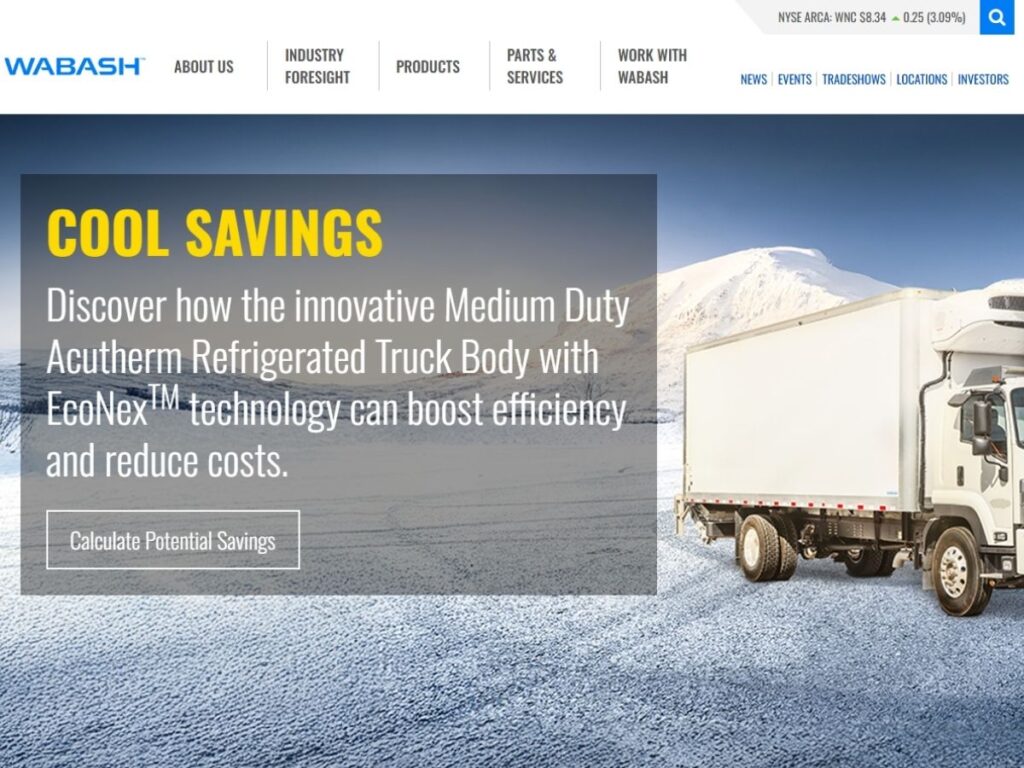
3. Rhinotrail
A while back, I was helping a logistics company expand their fleet for bulk cargo delivery. They didn’t need the flashiest brand, they just needed something solid, affordable, and built to last.
That’s how I came across Rhinotrail.
Based in Liangshan, Shandong, the heart of China’s trailer manufacturing zone. Rhinotrail builds semi-trailers with one goal in mind, to keep your operation moving. Whether you’re hauling steel, crops, fuel, or machines, they aim to solve three big problems: quality, customization, and on-time delivery.
Quick facts:
- Year founded: Over 12 years ago
- Founders: Internal company team (not publicly listed)
- Number of employees: Not disclosed, but operates a full production line with R&D and QC
- Monthly production: Capable of producing 2,500–3,000 units based on typical Liangshan scale
- Factory size: Located in Quanpu Town Industrial Park, part of a complete trailer supply chain
Company Story & Global Reach
Rhinotrai serve buyers across Africa, the Middle East, Southeast Asia, and other regions where durability matters. If your roads aren’t smooth, or if your loads are heavy and constant, you’ll want something that holds up. Rhinotrail’s customers include logistics companies, mining groups, agricultural exporters, and construction firms that move heavy gear daily.
They don’t just sell standard models. They specialize in adjusting trailers for local road laws, weather conditions, and terrain types.
Key Products & Technologies
Rhinotrail manufactures a wide range of semi-trailers. These include:
- Flatbed trailers: For containers, construction materials, and machinery
- Low-bed trailers: Used to haul oversized or heavy equipment
- Dump trailers: Side dump and rear dump for mining, roadwork, or bulk goods
- Tanker trailers: For fuel, water, cement, or chemicals
- Container chassis: To carry 20-ft, 40-ft, and 45-ft shipping containers
- Refrigerated trailers: Ideal for food and pharmaceutical transport
- Livestock and fence trailers: For farming, livestock, and produce transport
They also offer custom-built trailers, which means you can adjust axle count, height, length, suspension type, and load capacity to match your needs.
Key Strengths
Here’s why Rhinotrail stands out in this space:
- Customization: You can request region-specific specs, custom logos, paint, axle setups, or added features
- Durability: Uses Q345B and Q460C high-strength steel with anti-corrosion coating
- Factory testing: Every unit is tested at 150% of rated load before delivery
- Speed: Standard models ship in 20 days, some as fast as 7 days if in stock
- Support: Spare parts available, operator training videos, and quick quote response
They’ve also built their trailers for rough terrain and high-heat conditions. That makes them a strong option if you’re working in challenging environments.
Contact
- Website:https://www.rhinotrail.com
- Phone: +86 12312341234
- Address: Quanpu Town Industrial Park, Liangshan County, Jining City, Shandong Province, China
- Showroom hours: Not listed, contact by email for visits
- Dealer networks: Direct sales or through regional agents; contact for details
Final Verdict
Rhinotrail isn’t a flashy brand and that’s a good thing. They focus on building trailers that work hard, travel far, and hold up under pressure.
If you’re a construction company, mining group, or logistics provider moving freight in tough environments, this might be the right fit. They’re also worth looking at if you’re sourcing for Southeast Asia, Africa, or anywhere with import challenges because their team actually helps with that part.
Rhinotrail is best suited for:
- Medium to large transport companies
- Construction and mining operations
- Buyers looking for affordable, durable trailer solutions
- Regions with rough terrain or heavy loads
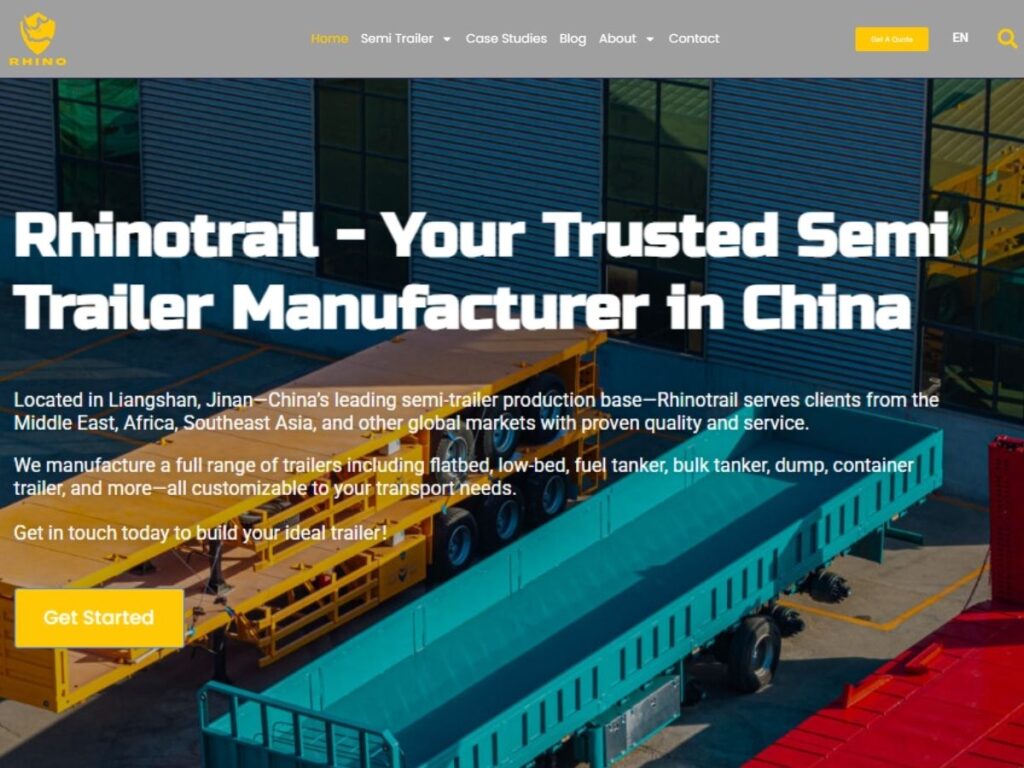
4. Utility Trailer Manufacturing Company
Utility Trailer Manufacturing Company has been building trailers since 1914. That kind of history doesn’t happen by chance. They’ve made it through wars, recessions, and massive changes in the transport industry. The reason? They’ve stayed focused on helping you move freight safely and efficiently.
This family-owned company is based in the United States and continues to be privately operated. Their mission has always been simple: build dependable trailers that last.
Quick facts:
- Year founded: 1914
- Founders: Barry G. Hamilton and family
- Number of employees: Approx. 3,000
- Monthly production: Not publicly listed, but they’re among the top producers in North America
- Factory size: Six manufacturing plants across the U.S., including Arkansas, Utah, Virginia, and Alabama
Their long history and nationwide setup mean fewer delays, better service, and plenty of product support.
Company Story & Global Reach
So how far does Utility’s reach go?
They serve customers across North America and have a dealer network that stretches into Mexico and Canada. This wide reach means you’re more likely to find parts, support, and advice no matter where your operations are based.
It also means they’ve adapted to different environments and industry needs, from cold storage in the Midwest to bulk freight in the South.
Key Products & Technologies
Utility builds a range of trailers designed for heavy-duty performance. Their top products include:
- Dry vans: Used for general freight
- Refrigerated trailers: Known as 3000R, used for temperature-sensitive goods
- Flatbed trailers: For hauling construction materials, equipment, and oversized cargo
- Curtainside trailers (Tautliner®): These allow for easy side loading while still protecting cargo
Each trailer is backed by thoughtful engineering. For example, their refrigerated units are built to keep a steady temperature, even in extreme climates.
Key Strengths
Here’s what Utility does well, based on my research and what I’ve heard from actual operators:
- Long history of solid manufacturing practices
- Strong U.S.-based production and service network
- Known for reliable, durable trailers especially refrigerated units
- Good resale value due to brand recognition
- Parts and service widely available through dealers
When you’re hauling every day, that kind of reputation gives you peace of mind.
Contact
- Phone: Varies by dealer, check website for locations
- Address: 17295 E. Railroad St., City of Industry, CA 91748
- Showroom hours: Dealer-specific
- Dealer network: Over 100 locations across North America
Final Verdict
Utility might not be flashy, but that’s part of their appeal. They build trailers that last. The kind that keeps working after 200,000 miles and still holds value.
If you’re looking for a dependable partner with strong U.S. support and long-term value, this company is worth a close look.
They’re best suited for:
- Logistics companies
- Cold chain transport (especially food and pharmaceuticals)
- Construction firms and equipment haulers
- North American buyers who want localized service
Their trailers might come with a higher price tag up front, but what you get in return is dependability and that’s not easy to put a price on.
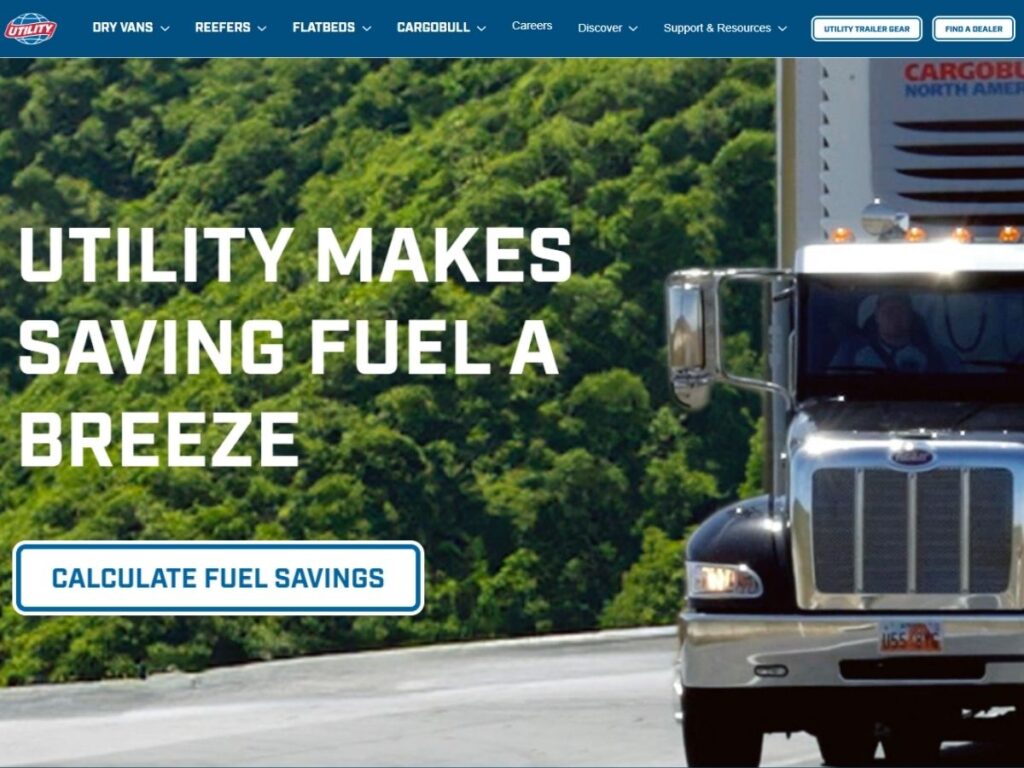
5. Great Dane
The first time I stepped inside a Great Dane trailer, it felt solid. No rattling panels. No patchy welds. Just clean, tight build quality. That stuck with me.
Great Dane has been around since 1900. Over the decades, they’ve become one of the most respected trailer manufacturers in the U.S. They build for people like you who need equipment that handles daily abuse—without falling apart after a few years.
From refrigerated trailers to dry vans and flatbeds, their focus is clear: reliable builds, good support, and thoughtful innovation.
Quick facts:
- Year founded: 1900
- Founders: The Savannah Blowpipe Company (which became Great Dane)
- Number of employees: Over 4,000
- Monthly production: Not disclosed, but they’re a top-three producer in the U.S.
- Factory size: Nine manufacturing plants and over 20 service centers nationwide
Company Story & Global Reach
Great Dane has evolved with the industry. They’ve embraced new technology, improved fuel efficiency, and focused on safety.
They mainly serve North American clients, including major fleets, small operators, and everything in between. Their large dealer network makes it easier for you to get support when you need it.
Key Products & Technologies
Great Dane offers several trailer options. Here’s a breakdown of what you’ll find:
- Refrigerated trailers (Everest): Popular in food transport
- Dry vans (Champion): Used for general freight
- Flatbed trailers (Freedom): Built for hauling tough loads
- Truck bodies: For local delivery fleets and specialty hauling
They also invest in smart trailer technology. Their “FleetPulse” system provides real-time diagnostics, like brake wear and tire pressure, which can help reduce downtime and prevent breakdowns.
Key Strengths
Here’s what makes Great Dane stand out:
- Strong focus on innovation and digital fleet tools
- Solid reputation for build quality and durability
- Large U.S.-based production network
- Responsive service and support centers
- Focused on safety with thoughtful design features
Contact
- Phone: (912) 644-2100
- Address: 602 E. Lathrop Ave., Savannah, GA 31415
- Showroom hours: Varies by dealer
- Dealer network: Extensive coverage across the U.S.
Final Verdict
If you’re running long-haul routes or refrigerated deliveries, Great Dane trailers are worth considering. They’re solid, smart, and backed by decades of experience.
Their FleetPulse technology is a great bonus if you’re managing a fleet and want real-time updates on trailer condition.
Great Dane is a good fit for:
- Food and beverage distributors
- National logistics companies
- Regional carriers that prioritize uptime
- Buyers looking for U.S.-based support
They may not be the cheapest, but what you’re paying for is quality that lasts and in my book, that always pays off over time.
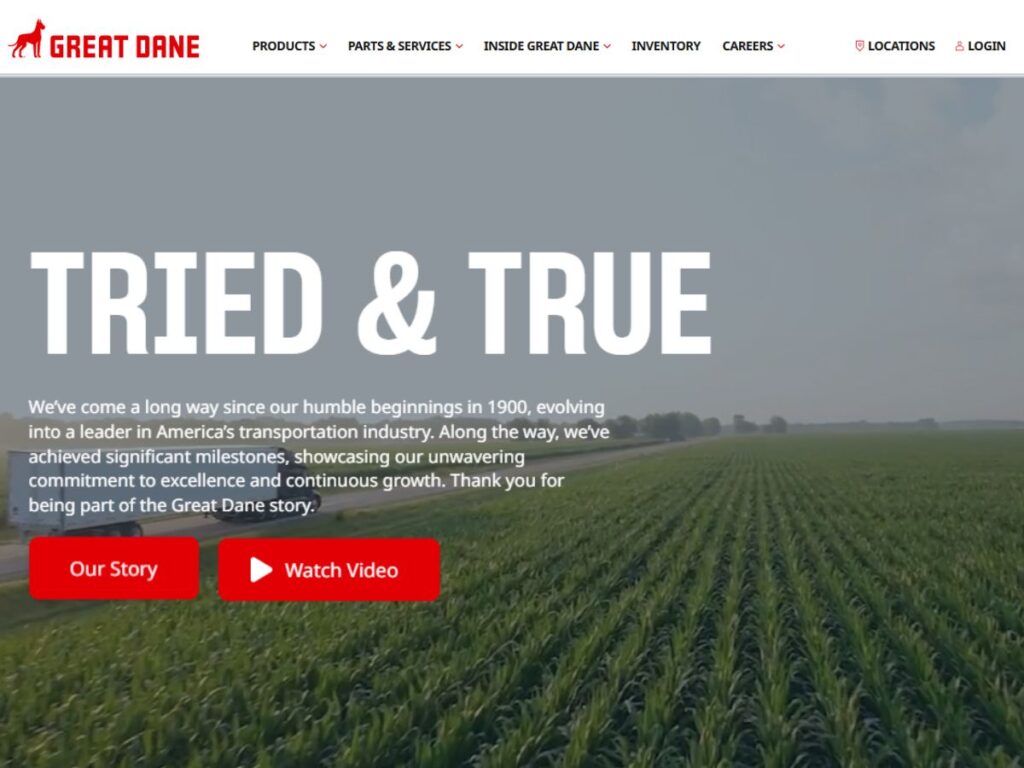
6. Schmitz Cargobull
I still remember my first visit to Germany for a transport expo. Booth after booth showed off trailers, but one stood out: Schmitz Cargobull. The staff spoke with confidence, the models looked sturdy, and their brand had presence. It made me curious. What made them different?
Schmitz Cargobull is one of the oldest trailer manufacturers in Europe. They began as a wagon-building family business in 1892 and eventually transitioned into full-scale trailer production. Today, they’re known across Europe and beyond for building trailers that combine durability with smart technology.
Their focus is to support transport companies like yours with equipment that performs well on long hauls, across borders, and in changing weather.
Quick Facts:
- Year Founded: 1892
- Founder: Heinrich Schmitz
- Number of Employees: Approximately 6,000
- Annual Production Capacity: Around 60,000 vehicles
- Factory Size: 10 production plants across Europe and Australia
Key Strengths
Schmitz Cargobull stands out in the industry for several reasons:
- Innovation: They’ve been pioneers in trailer telematics, offering real-time data to optimize fleet management.
- Comprehensive Services: Beyond manufacturing, they provide financing, spare parts supply, service contracts, and used vehicle trading, supporting you throughout the vehicle’s lifecycle.
- Global Presence: With production facilities in Germany, Lithuania, Spain, England, Turkey, Slovakia, and Australia, they cater to a broad market.
Key Products & Technologies
Schmitz Cargobull offers a diverse range of trailers to meet various transportation needs:
- Boxer Semi-Trailers: Ideal for dry and refrigerated freight.
- Flatbed and Curtainsider Semi-Trailers: Suitable for packaged goods, steel, paper, and beverages.
- Tipper Semi-Trailers: Designed for bulk goods in construction and agriculture.
- Container Chassis: For efficient container transport.
Contact
If you’re considering reaching out to Schmitz Cargobull:
- Phone: +49 2558 81-0
- Address: Bahnhofstraße 22, 48612 Horstmar, Germany
- Dealer Network: Extensive network across Europe and beyond; use their dealer locator to find a dealer near you.
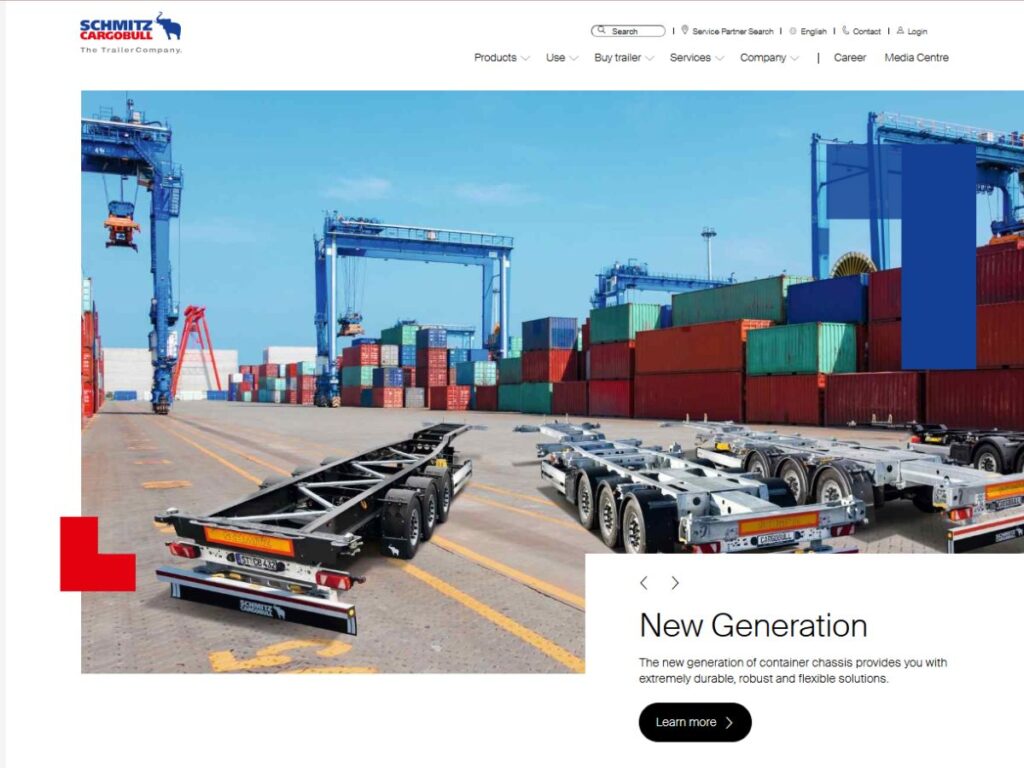
7. Faymonville Group
The first time I saw a Faymonville trailer, it was hauling a wind turbine blade along a narrow mountain road. That image stuck with me. It wasn’t just a trailer, it was a piece of engineering doing something most haulers wouldn’t even attempt.
Faymonville Group specializes in trailers for heavy, oversized, and abnormal loads. If you move things that don’t fit standard shipping dimensions like cranes, turbines, tanks, or large construction gear—this company is built for you.
Based in Belgium, they’ve been around since the 1960s, slowly growing into one of the most trusted names in heavy-duty hauling across Europe and beyond.
Quick Facts:
- Year Founded: 1960s
- Founder: Berthold Faymonville
- Number of Employees: Over 1,400
- Annual Production Capacity: Approximately 3,000 vehicles
- Factory Size: 5 production facilities totaling around 175,000 m²
Company Story & Global Reach
Why does it matter that Faymonville serves such a niche?
Because if you’re hauling oversized freight, standard trailers won’t cut it. Faymonville builds for the jobs that most other companies avoid. They have sales and service locations throughout Europe, the U.S., the Middle East, and parts of Africa.
Their experience with road regulations, height limits, and extreme load weights gives you a huge advantage when planning routes or getting permits.
Key Products & Technologies
Here’s what they manufacture:
- MultiMAX: Extendable semi-low loaders for machinery
- MegaMAX: Low-loaders for high-clearance cargo
- GigaMAX: Modular trailers for ultra-heavy loads
- TeleMAX: Telescopic flatbeds used for long items like wind blades
- CombiMAX: Customizable modular trailers with hydraulic steering
Most of their models come with hydraulic suspension and self-steering axles. These help with maneuvering tight turns and distributing weight evenly across axles.
You can also adjust platform height and length depending on your load.
Key Strengths
Here’s why Faymonville gets a lot of respect in the heavy-haul world:
- Focused expertise in oversized and abnormal loads
- Hydraulic steering for better control on curves
- Modular trailer systems
- Engineering that meets complex transport rules
- Solid support in Europe, U.S., and Middle East
They’re not a mass-market builder. They’re a problem-solver for tough hauls.
Contact
- Phone: +32 80 67 99 99
- Address: Rue de la Carrière 18, B-4970 Büllingen, Belgium
- Showroom hours: Contact to schedule a visit
- Dealer network: Present in over 50 countries, including North America and the Middle East
Final Verdict
If you’re hauling generators, cranes, wind turbines, or oversized equipment, Faymonville is one of the few companies that truly understands your world.
Their trailers aren’t built for speed. They’re built for safety, precision, and serious weight.
Limitations? They’re more expensive and may be overbuilt if you’re handling light freight. But if your work depends on moving the unmovable, the investment makes sense.
Best for:
- Heavy equipment movers
- Renewable energy logistics
- Specialized transport fleets
- Businesses in need of modular, customizable trailers
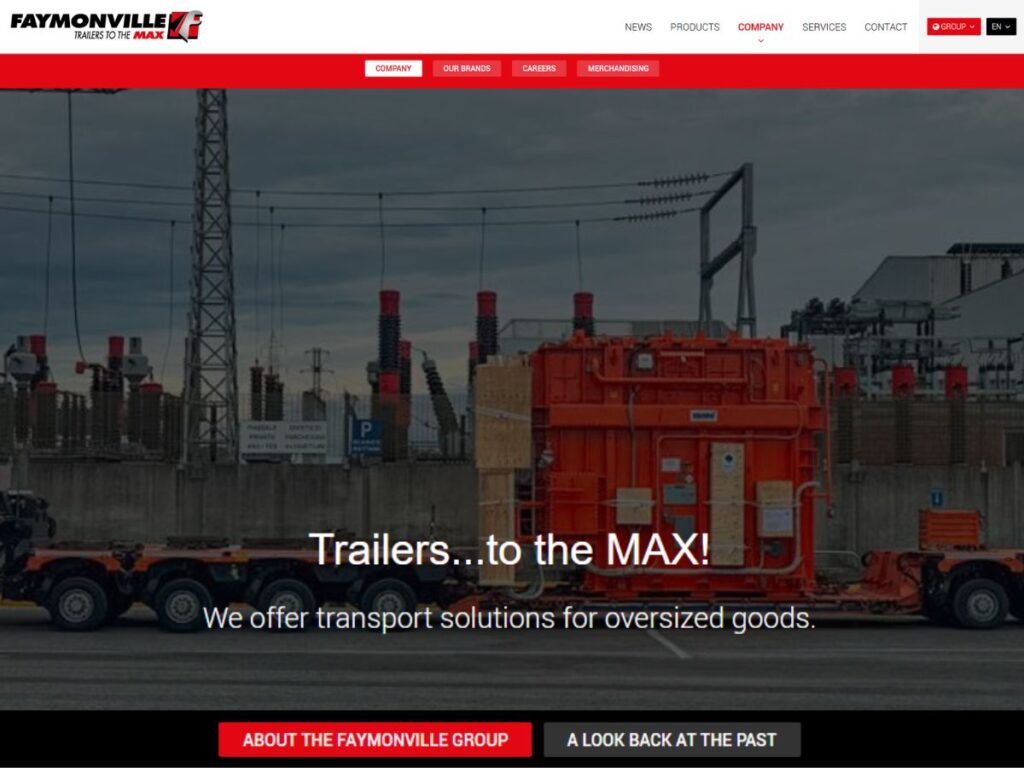
Conclusion
You’ve just explored 7 manufacturers that build more than trailers.
From heavy hauls to refrigerated loads, from flatbeds to custom builds, you now have options backed by real experience, not guesswork.
I told you earlier about the time our trailer gave out. That job never recovered. But now? We only work with names we trust. This list was built from that hard lesson.
Now it’s your turn.
What kind of trailer do you need to grow your business?
Don’t wait for breakdowns to decide. Contact us today and find a manufacturer who gets it right the first time.

